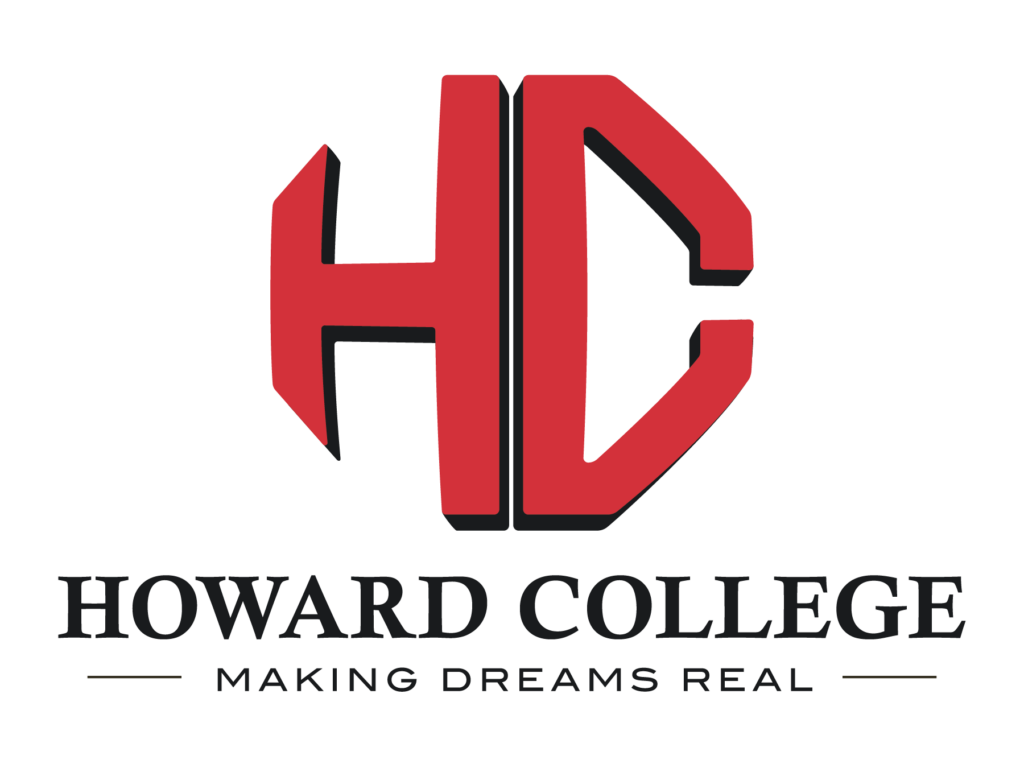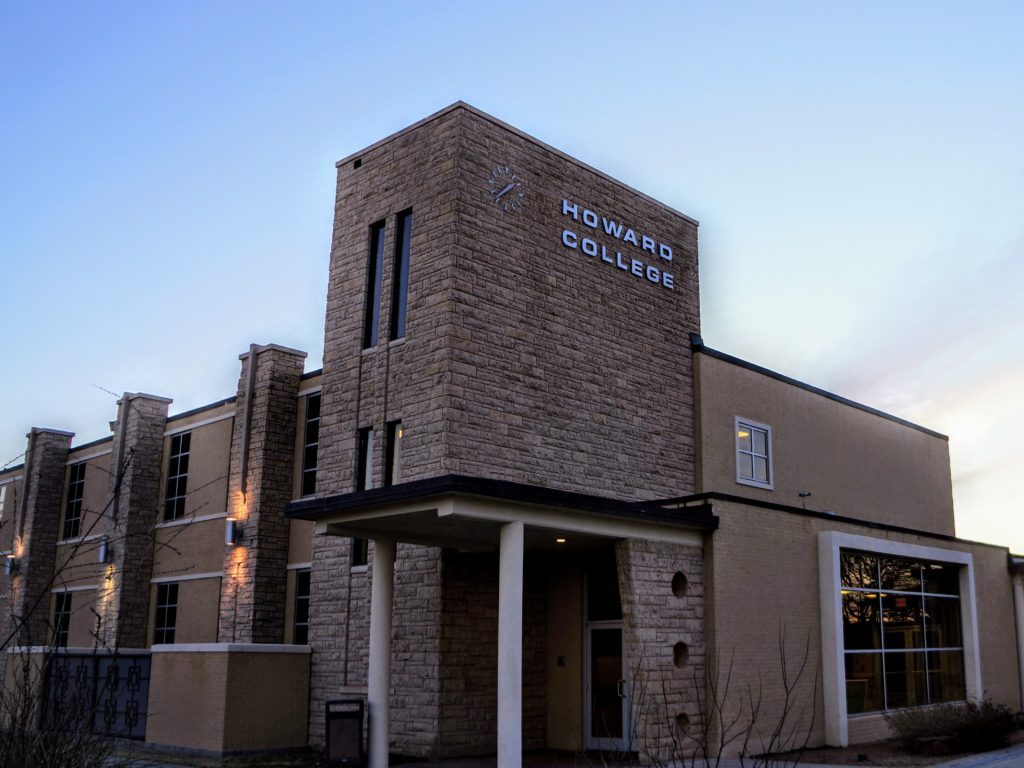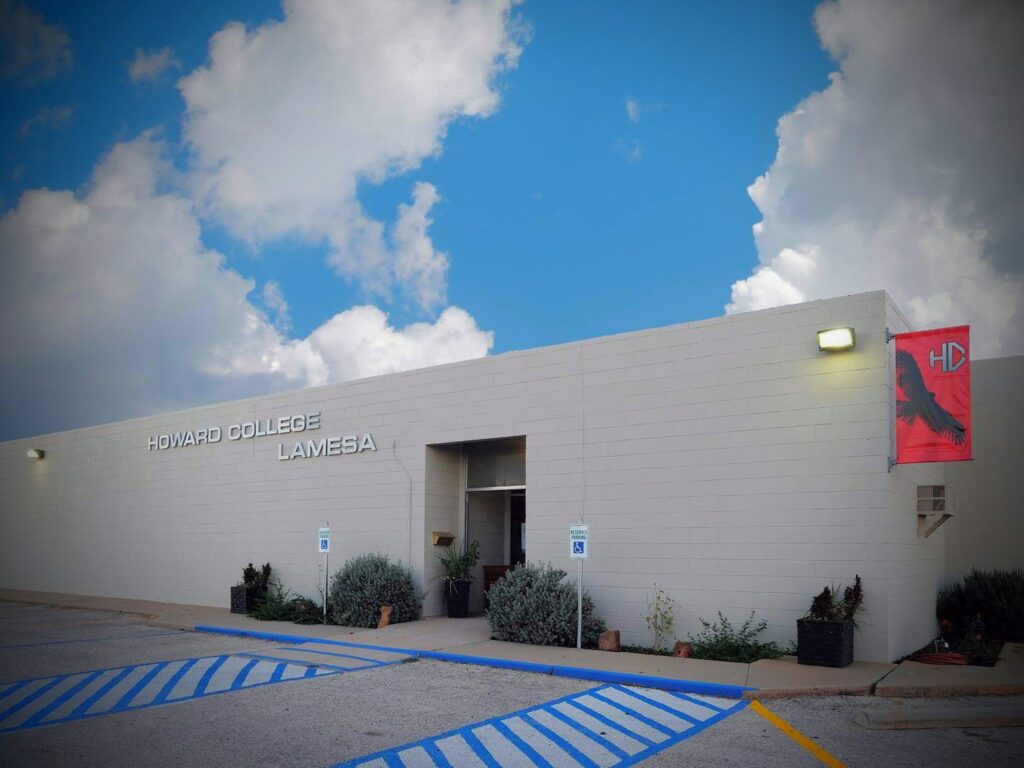Howard College is committed to providing safe and non-discriminatory learning, living, and work environments for all members of the College community. In accordance with applicable federal and state law, the College prohibits discrimination, including harassment, on the basis of race, color, national or ethnic origin, religion, sex, pregnancy, disability, age, sexual orientation, veteran status, or any other legally protected characteristic in employment, educational programs, and admissions. Individuals who believe they have experienced harassment or discrimination prohibited by this statement are encouraged to contact the Office of the Title IX Coordinator.
Christi Fenter – Title IX Coordinator (432) 264-5029
cfenter@howardcollege.edu
Students with Financial Aid awards that cover their entire tuition and fees and have a credit balance may be able to charge books and supplies in the College Bookstore. The student must have their student identification card or government issued ID and their schedule to purchase books and supplies at the college bookstore. Students do not have to charge their books at the college bookstore and have an option to not use their remaining aid funds.
READ CAREFULLY!
The application to my student account and/or use of Federal, State, or other financial aid funds certifies that I agree and understand the conditions outlined below. I fully understand that if I do not adhere to the conditions of aid it can result in the withdrawal and/or possible repayment of aid awarded.
- I understand that my financial aid awards are based on my full time enrollment (12 credit hours simultaneously) for each full semester of the academic year. I also understand that enrolling in flex or mini courses may affect my full time status.
- I understand that I cannot receive Federal or State aid simultaneously from two separate institutions for the same enrollment period.
- I understand that I must attend all of the classes for which I am receiving aid or I may be required to refund my aid.
- I understand that I must notify the Financial Aid Office of additional aid I am receiving that is not included on my award letter; and that my other aid may change (be reduced) based on the new/additional awards.
- I must maintain satisfactory academic progress (SAP) in a course of study leading toward a degree or certificate at Howard College/SWCID as detailed in the Howard College/SWCID catalog. I understand that if I take courses outside my degree plan, it may have an effect on my eligible for aid. Further, it is my responsibility to contact my academic advisor regarding my degree plan.
- I understand that under federal law, students attending Howard College/SWCID who receive Federal Title IV aid (Pell, SEOG, ACG, and/or Federal Stafford loans) and completely withdraw before the 60 percent point (in time) in the period of enrollment/payment period will be required to return any unearned funds. If a student ceases attendance and does not officially withdraw, he/she will be considered “unofficially withdrawn” and subject to the return of Title IV funds. A student receiving all F’s and W’s for a semester may also be subject to the return of Title IV funds. Attendance records will be reviewed to determine if and when the student ceased attendance. In some instances, the student may owe both the federal government and the school. I must refund that portion of aid for which I am no longer eligible. Students owing either the government or the school will be ineligible for any further federal aid until funds are repaid.
- I must inform the Office of Student Financial Aid of any changes in resources, marital status, reduction of hours enrolled, and any other changes that may affect my eligibility for aid. Additionally, I will keep all personal information updated through the Registrar’s Office, i.e. mailing address, phone number, etc.
- I must respond in a timely manner to inquiries made by the Financial Aid Office in order to keep my application current and in good standing.
- I have not been convicted of any felony or crime; nor have I been convicted of any felony or crime involving a controlled substance.
The following conditions apply if I have been awarded aid from one or a combination of the programs mentioned below. Select a program for more information.
Federal Pell Grant
The Pell Grant will be determined based upon the student’s calculated expected family contribution and a student’s full-time enrollment (12 semester hours) for a full academic year. If the student does not plan to enroll full time, the Pell award WILL be reduced based upon less than half-time, half-time, or three- quarter time enrollment. The Federal Pell will be awarded based on the Federal Pell Payment Schedule published for the aid year. Cosmetology is a clock hour program and therefore is not awarded the same as academic courses. The Pell-Grant will be awarded in three equal disbursements. The first will be at your initial enrollment. The following disbursements will be awarded once you reach 500 hours, and 1000 hours.
Federal ACG (Academic Competitiveness Grant)
An eligible student may receive an Academic Competitiveness Grant (AC Grant) of up to $750 for the first academic year of study and up to $1,300 for the second academic year of study. To be eligible for each academic year, a student must: be a U.S. citizen; be a Federal Pell Grant recipient; be enrolled full-time in a degree program; be enrolled in the first or second academic year of his or her program of study at a two-year or four-year degree-granting institution; have completed a rigorous secondary school program of study (after January 1, 2006, if a first-year student, and after January 1, 2005, if a second-year student); if a first-year student, not have been previously enrolled in an undergraduate program; and if a second-year student must have completed 30 semester hours and must have at least a cumulative 3.0 grade point average on a 4.0 scale for the first academic year.
Federal SEOG (Supplemental Educational Opportunity Grant)
The Federal Supplemental Educational Opportunity Grant (FSEOG) funds are limited federal grant funds awarded to students with exceptional need. Based on the amount of funds available for the award year. Generally, $600 awards will be made to those students with remaining financial aid need (after Pell awards). A student must have a zero EFC to receive the SEOG. No student will receive both the SEOG and TPEG awards) and students will be awarded for the earliest completed financial aid files. The SEOG funds may not exceed the student’s financial aid need.
College Work Study – Federal & State Work Program
If awarded Federal or State Work Study, the amount awarded is an estimate of earnings and means that you are eligible to be employed under the Federal or State Work Study at Howard College/SWCID. These funds will NOT be disbursed unless you obtain employment; you should report to the Office of Financial Aid during the first week of classes for job placement opportunities. If your aid preference included work, and you were not awarded work study, you must contact your financial aid representative and schedule an appointment. File a Free Application for Federal Student Aid (FAFSA). Enrolled in at least half-time (6 hours) in an eligible degree or certificate program at Howard College. Complete the student employee application paperwork and submit to financial aid.
Estimated Federal Direct Loan Eligibility
These amounts indicate the amount you are eligible to borrow through the Federal Direct Loan Program. There are two types of Federal Direct Loans that you may be eligible for – subsidized and unsubsidized. The subsidized Federal Direct Loan is need-based. If you qualify, the government pays the lender the interest due on the loan while you are in school and during your grace and deferment periods. The unsubsidized Federal Direct Loan is for students who don’t qualify for a subsidized Federal Direct Loan or who qualify for less than the annual maximum amount. You are responsible for all interest that accrues on an unsubsidized Federal Direct Loan. Both types of loans have a variable interest rate. You are neither required nor encouraged to borrow these funds. However, if you do feel you will need additional money to pay expenses while in school, refer to the loan request and lender information form for additional information. Direct Loan funds will be applied to the students account on the last day to pay each semester, any remaining loan funds will be applied to ONE CARD within 14 days after direct loan approval. 30 day delay loan funds will be applied to students account after the 30th class day and any remaining loan funds will be applied to ONE CARD within 14 days after direct loan approval. Cosmetology initial remaining loan funds will be applied after 150 clock hours are completed. Thereafter, loan funds will be disbursed after the completion of 500 clock hours and 1,000 clock hours.
Texas Educational Opportunity Grant Program (TEOG)
The Texas Educational Opportunity Grant program is for students who are attending a public community college, technical college, or public Texas institution. The program is administered through the Texas Higher Education Coordinating Board (THECB). The THECB determines each academic year the maximum award amounts for the program. The student must have applied for financial assistance by submitting the FAFSA or Texas Application for State Financial Aid (TASFA) applications. To be eligible for a TEOG Initial award, a student must be enrolled at least half-time(6 semester credit hours) in the first 30 hours(excluding credits for dual enrollment or by examination) towards an Associate Degree or certificate program at a public two-year institution of higher education.
The institution will give highest priority in awarding grants to students who demonstrate the greatest financial need. The priority family’s Expected Family Contribution (EFC) for 2022-2023 is $6,454. Priority for awarding funds first goes to Renewal Year(RY) students before Initial Year (IY) students. To receive a Renewal award, the student must be a previous TEOG Initial award recipient. Once all eligible RY students have been awarded, precedence does to eligible IY applicants who do not exceed the priority EFC. Highest priority awarding goes to those students who demonstrate greatest financial need, defined as cost of attendance minus the EFC.
The student must be a Texas resident, have applied for financial aid or assistance, have financial need, and be registered with selective service, or be exempt. At the end of the first year, the student must meet financial aid SAP requirements set by the institution to be eligible for a TEOG Renewal award. The academic standards at the end of the second academic year are completion of at least 75 percent of the total attempted hours and a cumulative grade point average of at least 2.5. A student who maintains eligibility will continue to receive the award for up to 75 credit hours, four years, or upon completion of an Associate or Baccalaureate Degree, whichever comes first. The student cannot be concurrently receiving TEXAS Grant.
The Texas Educational Opportunity Grant (TEOG) requires that the student not have been convicted of a felony or an offense under Chapter 481, Health and Safety Code (Texas Controlled Substances Act). Institutions are required to collect a signed electronic or paper statement from each TEOG recipient prior to the disbursement of funds confirming eligibility in regards to the convictions of a felony or any offense under Chapter 481, Health and Safety Code. The statement may also be required to confirm selective service registration if the selective service cannot be confirmed through the ISIR, SSS.gov website, or the student is under the age of 18. The statement will be required for all TASFA applications.
Students may be awarded a total of 3 awards (Fall, Spring, and Summer) in an academic year. The 2022-23 award maximum for public community colleges is $5,121 for the year, $1,707 per semester.
TPEG (Texas Public Education Grant) – State Grant
(Refer to the Rules and Regulations of the Texas Higher Education Coordinating Board, Chapter 22, Student Services.)
Prior to beginning the awarding of aid for the academic year, the amount of funds available to award from the Texas Public Education Grant—resident and non-resident—is determined by consulting with the Controller. Care should be exercised to ensure that excess funds are not allowed to remain on deposit which would necessitate the return of those funds to the Coordinating Board at year end.
Based on the amount of funds available for the award year, TPEG Resident and Non-Resident awards will be made to eligible students. Generally, $600 awards will be made to those students with remaining financial aid need (after Pell and SEOG awards; a student must have a zero EFC to receive the SEOG. No student will receive both the SEOG and TPEG awards) for the earliest completed financial aid files. The TPEG funds may not exceed the student’s financial aid need. As funds begin to diminish, a reduced amount may be awarded to those students with need in the later awarding groups.
TPEG awards are generally awarded for the Fall and Spring semesters but may be awarded for Summer if funds are available and the student shows need. Awards are also generally made for $300 per semester but may, in a limited number, exceed that amount on an individual basis.
- I have the right to know what student financial aid programs are available at Howard College/SWCID.
- I have the right to know the deadlines (if any) for submitting applications for each financial aid program.
- I have the right to know how my financial need was determined, including how various expenses in my budget are considered.
- I have the right to know what resources are considered in the calculation of my awards.
- I have the right to request an explanation of the various programs in my financial aid package.
- I have the right to consult with persons in the Financial Aid Office concerning my application for assistance, budgeting and/or financial problems which might arise.
- I have the right to cancel any loan proceeds received via individual borrower check.
- I will check my Howard College/SWCID email on a regular basis.
- I must complete all application forms accurately and submit them on time to the appropriate office.
- I must provide correct information. In most instances, misreporting information on financial aid forms is a violation of federal law and may be a criminal offense, which could result in indictment under the U.S. Criminal Code.
- I must provide any additional documentation, verification information, or corrections requested by the Financial Aid Office or the agency to which I submitted my application before any funds will be disbursed.
- I am responsible for reading, understanding, and retaining copies of all forms I am asked to sign.
- I must accept responsibility for all agreements I sign.
- I am responsible for knowing the sources of financial aid, which I receive and whether the aid is a grant, loan, or scholarship. If the aid is a loan, I must know to whom repayment is to be made and the terms of repayment.
- I must keep the Financial Aid Office informed of my correct address at all times – while I am in school and after graduation – while any loans are outstanding.
- It is my responsibility to inform the Financial Aid Office of any change in my student or financial status. This includes, but is not limited to: marriage, divorce, childbirth, employment of myself, spouse, or parents, etc.
- It is my responsibility to complete an exit interview online at www.mappingyourfuture.org Entrance/Exit Counseling, prior to my separation from Howard College/SWCID either by graduation or withdrawal.
- I have read and understand this entire document which I will acknowledge by allowing financial aid funds to be applied to my student account and/or by using these financial aid funds.
STUDENTS CONVICTED OF POSSESSION OR SALE OF DRUGS |
A federal or state drug conviction can disqualify a student for FSA funds. The student self-certifies in applying for aid that he is eligible; you’re not required to confirm this unless you have conflicting information.
Convictions only count against a student for aid eligibility purposes (FAFSA question 23c) if they were for an offense that occurred during a period of enrollment for which the student was receiving Federal Student Aid—they do not count if the offense was not during such a period, unless the student was denied federal benefits for drug trafficking by a federal or state judge. Also, a conviction that was reversed, set aside, or removed from the student’s record does not count, nor does one received when she was a juvenile, unless she was tried as an adult.
The chart below illustrates the period of ineligibility for FSA funds, depending on whether the conviction was for sale or possession and whether the student had previous offenses. (A conviction for sale of drugs includes convictions for conspiring to sell drugs.)
POSSESSION OF | SALE OF |
| 1st Offense 1 year from date of conviction | 1st Offense 2 years from date of conviction |
| 2nd Offense 2 years from date of conviction | 2nd Offense Indefinite period |
| 3+ Offenses Indefinite period | — |
If the student was convicted of both possessing and selling illegal drugs, and the periods of ineligibility are different, the student will be ineligible for the longer period. Schools must provide each student who becomes ineligible for FSA funds due to a drug conviction a clear and conspicuous written notice of his loss of eligibility and the methods whereby he can become eligible again.
A student regains eligibility the day after the period of ineligibility ends or when he successfully completes a qualified drug rehabilitation program or passes two unannounced drug tests given by such a program. Further drug convictions will make him ineligible again.
Students denied eligibility for an indefinite period can regain it after successfully completing a rehabilitation program (as described below), passing two unannounced drug tests from such a program, or if a conviction is reversed, set aside, or removed from the student’s record so that fewer than two convictions for sale or three convictions for possession remain on the record. In such cases, the nature and dates of the remaining convictions will determine when the student regains eligibility. It is the student’s responsibility to certify to you that she has successfully completed the rehabilitation program; as with the conviction question on the FAFSA, you are not required to confirm the reported information unless you have conflicting information.
When a student regains eligibility during the award year, you may award Pell grant, TEACH, and Campus-based aid for the current payment period and Direct loans for the period of enrollment.
STANDARDS FOR A QUALIFIED DRUG REHABILITATION PROGRAM
A qualified drug rehabilitation program must include at least two unannounced drug tests and satisfy at least one of the following requirements:
- Be qualified to receive funds directly or indirectly from a federal, state, or local government program.
- Be qualified to receive payment directly or indirectly from a federally or state-licensed insurance company.
- Be administered or recognized by a federal, state, or local government agency or court.
- Be administered or recognized by a federally- or state-licensed hospital, health clinic, or medical doctor.
If you are counseling a student who will need to enter such a program, be sure to advise the student of these requirements. If a student certifies that he has successfully completed a drug rehabilitation program, but you have reason to believe that the program does not meet the requirements, you must find out if it does before paying the student any FSA funds.




